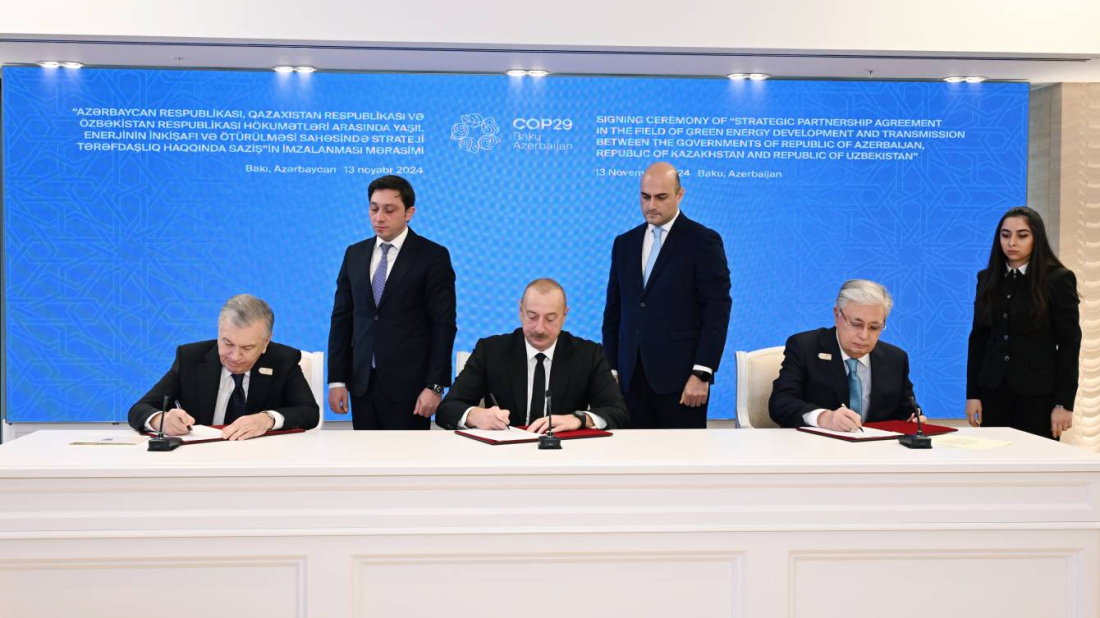Former UK ambassador to U.S. Peter Mandelson taken into custody
The former British ambassador to the U.S. Peter Mandelson has been arrested by police in London on suspicion of misconduct in public office....

Azerbaijan's President Ilham Aliyev has approved an agreement between Azerbaijan, Kazakhstan and Uzbekistan on strategic partnership in the development and transmission of green energy.
The agreement was signed by leaders of the three countries on November 13, 2024, initiating a Caspian Sea electricity transmission cable project. To ensure the efficient implementation of the project, the joint venture "Green Corridor Alliance" was established, with its headquarters in Baku.
The proposed cable will link the energy systems of the three countries, promoting energy security, sustainable and economic growth in the region.
It also aims to establish a "green corridor" for the transmission of renewable energy from the Caspian region to Europe via another high-voltage submarine cable -the Black Sea Cable - connecting the South Caucasus region with the European Union.
The two power transmission cables are part of a broader strategy to connect the Caucasus region with continental Europe.
The European Bank for Reconstruction and Development (EBRD) is expected to play a crucial role in this initiative, providing policy guidance and investments in renewable energy.
The project’s initial budget exceeds $2 billion, and preliminary timelines suggest commissioning by 2029, said Aida Sitdikova, the EBRD’s Director of Energy, Eurasia, Middle East and Africa, Sustainable Infrastructure Group, said in an interview with The Astana Times.
The two projects could create a transformative green energy corridor, harnessing Central Asia’s abundant wind and solar resources for export to Europe—diversifying energy supplies and supporting the continent’s decarbonization efforts, she said underlining that economic feasibility remains critical for the project’s success.
"Renewable energy from Kazakhstan, Uzbekistan, Azerbaijan, and Georgia must be offered at competitive prices for European consumers. Europe has alternative sources, such as North Africa and the Middle East, so the cost-competitiveness of both generation and transmission will be the key determining factor," EBRD expert noted.
A seven-month-old Japanese macaque has drawn international attention after forming an unusual bond with a stuffed orangutan toy after being rejected by its mother.
Divers have recovered the bodies of seven Chinese tourists and a Russian driver after their minibus broke through the ice of on Lake Baikal in Russia, authorities said.
Iran announced on Saturday (21 February) that it has designated the naval and air forces of European Union member states as “terrorist entities” in a reciprocal move after the EU blacklisted the Islamic Revolutionary Guard Corps (IRGC).
Pakistan said it carried out cross-border strikes on militant targets inside Afghanistan after blaming a series of recent suicide bombings, including attacks during the holy month of Ramadan, on fighters it said were operating from Afghan territory.
Italy said a fond farewell to the Winter Olympics on Sunday with an open-air ceremony in the ancient Verona Arena that celebrated art and sporting achievement at a Games lauded as a model for how to stage such events.
The administration of U.S. President Donald Trump on Thursday (12 February) announced the repeal of a scientific finding that greenhouse gas emissions endanger human health, and eliminated federal tailpipe emissions standards for cars and trucks.
Tropical Cyclone Gezani has killed at least 31 people and left four others missing after tearing through eastern Madagascar, the government said on Wednesday, with the island nation’s second-largest city bearing the brunt of the destruction.
Rivers and reservoirs across Spain and Portugal were on the verge of overflowing on Wednesday as a new weather front pounded the Iberian peninsula, compounding damage from last week's Storm Kristin.
Morocco has evacuated more than 100,000 people from four provinces after heavy rainfall triggered flash floods across several northern regions, the Interior Ministry said on Wednesday.
Greenland registered its warmest January on record, sharpening concerns over how fast-rising Arctic temperatures are reshaping core parts of the island’s economy.
You can download the AnewZ application from Play Store and the App Store.

What is your opinion on this topic?
Leave the first comment